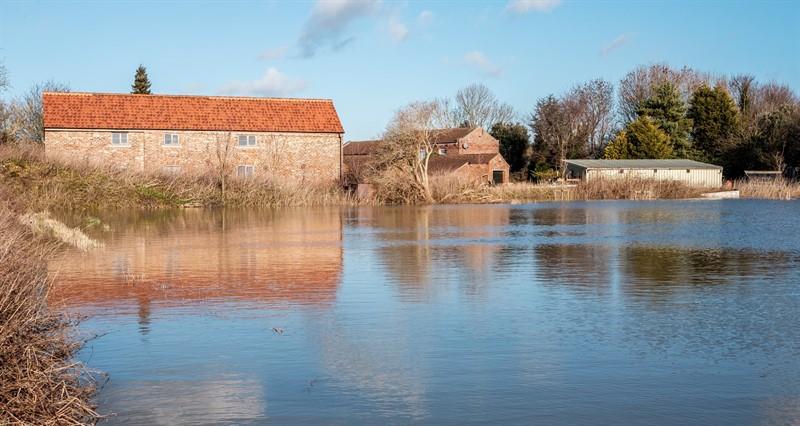The Rural Flood Resilience Partnership has launched today to help farmers and rural communities adapt to a changing climate.
With rural communities increasingly on the frontline of extreme weather and the devastating impacts of flooding, the partnership has been established to improve collaboration, deepen understanding of rural vulnerabilities, and support rural communities and agricultural businesses in building their resilience to present and future flood risks and coastal erosion.
But, the NFU has warned that more information is still needed about the Farming Recovery Fund and how it can help those farm businesses recover from devastating floods.
The partnership has been equally founded by six organisations:
- Action with Communities in Rural England
- Association of Drainage Authorities
- Country Land and Business Association
- Environment Agency
- National Farmers’ Union
- Natural England
“We're pleased to be involved in this new Partnership – we hope it will provide practical solutions based on tangible evidence to some of the challenges farmers face in the event of flooding.”
NFU Vice President Rachel Hallos
Today, the partnership publishes its work plan covering 2024 to 2026. The work plan sets out 21 actions supporting seven strategic outcomes focused on:
- Developing the evidence base behind decision-making to increase resilience.
- Ensuring communities farmers and landowners have access to quality advice and support.
- Engaging rural communities in flood resilience.
The partnership forms part of the wider work that all partners are undertaking on flood and coastal resilience.
Find out more about the work plan at: GOV.UK | Rural Flood Resilience Partnership workplan 2024 - 2026
“Farmers are on the frontline of climate change – our biggest challenge. The extreme weather this brings is one of the main threats to UK food security.”
Rachel Hallos
Strengthening resilience
NFU Vice President Rachel Hallos said: “The NFU is pleased to be involved in this new Partnership and hope it will enable farmers and rural communities to strengthen the resilience of their homes and businesses by providing practical solutions based on tangible evidence to some of the challenges they face in the event of flooding.
“It will also give rural communities the means to influence decision making, provide access to resources and support action on the ground, strengthening rural resilience to flooding in a changing climate.
Lasting impact on farming businesses
“Farmers are on the frontline of climate change – our biggest challenge. The extreme weather this brings is one of the main threats to UK food security and more severe storms, devastating floods, and increased periods of little or no rain are all impacting our ability to produce food.
“The country has just experienced its wettest 18 months since records began in 1836 which left many thousands of acres of productive farmland under water.”
Greater support from Farming Recovery Fund
The NFU is continuing to work with the RPA and Defra to seek clarity on developing the Farming Recovery Fund offer. The new Floods Resilience Taskforce met earlier this month to discuss how they will speed up and co-ordinate flooding preparation and resilience between central government, local authorities and community responders, and emergency services.
We are also talking to ministers at the Labour Party's annual conference, pressing the need for greater support to help farm businesses recover from the relentless heavy rain and devastating flooding that was seen last winter.
“There are still many farm businesses in dire need of support, and we are awaiting details of how the Farming Recovery Fund can help those businesses recover from the impacts of the devastating flooding and saturated ground,” said Rachel.
Highlighting the impact of flooding
Following the devastation caused by Storms Babet and Ciarán last year, more than 1,750 people added their names to our open letter urging all political parties to outline their plans to protect farming businesses from flooding.
Our letter called for:
- A proactive management plan for Environment Agency controlled watercourses and flood defences as a priority.
Changes to the Flood Defence Grant in Aid cost-benefit analysis. The way that funding for flood defences is currently allocated leaves farmers and rural communities at a higher risk than urban communities. - Recognition of the public goods farmers deliver. Flood storage is often provided at great cost to the landowner to protect surrounding urban areas. Farmers must be fairly paid for delivering this service with agreements put in place that allow farmers and growers to plan for it and ensure recovery procedures are in place.
The NFU delivered this message as a matter of urgency to Westminster to show that farmers demand immediate policy action and need a clear plan for the future to protect against flooding.
NFU Education should today (23 September) be filming on member Amy Wilkinson's farm, capturing harvest content ready for future live lessons with school children. But with the latest period of wet weather preventing Amy from harvesting her wheat, the team will instead capture content that looks at the impact the rain has had on this year's harvest.



